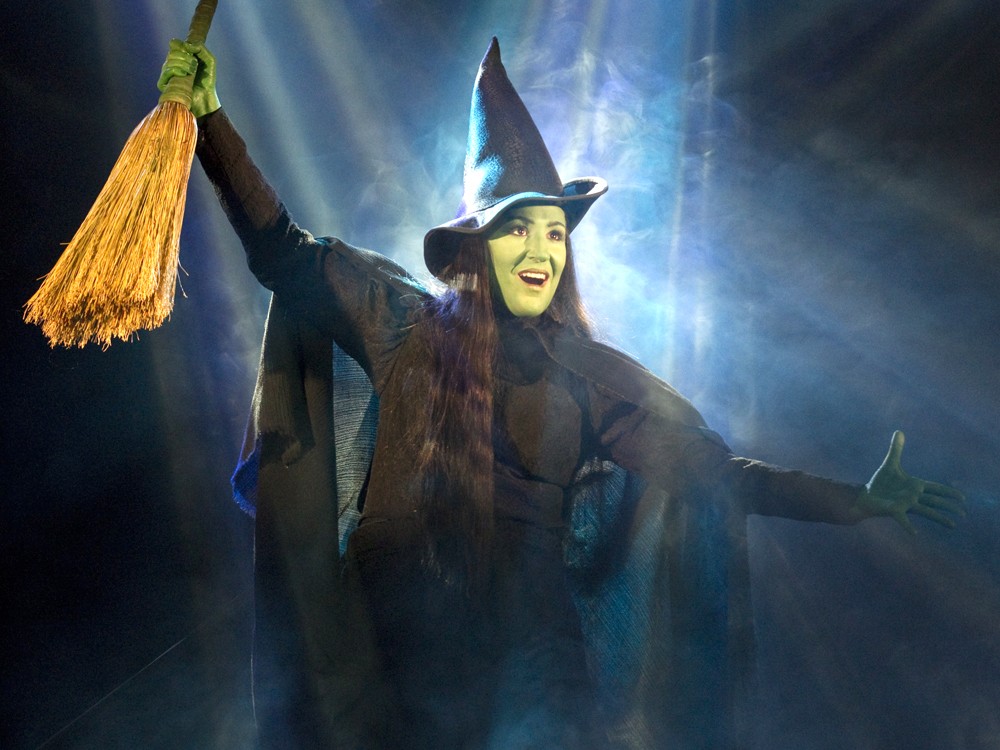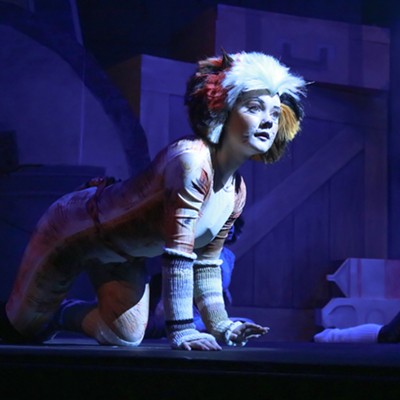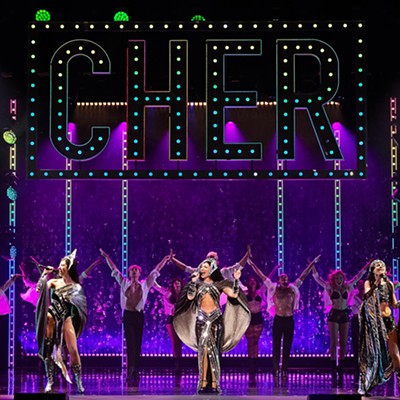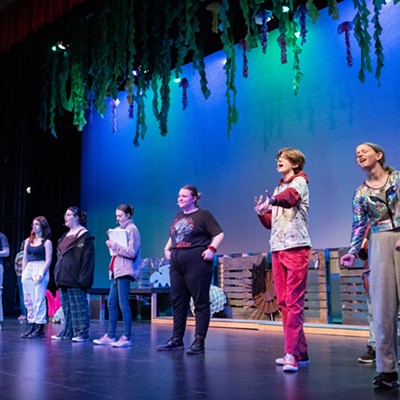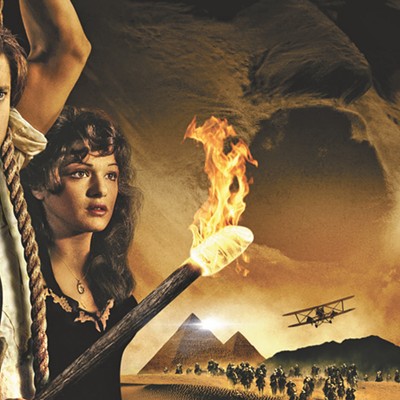Wicked isn’t your grandmother’s Wizard of Oz. With its political satire, soaring anthems and sly inversion of good and evil, the Broadway musical twists its retelling of L. Frank Baum’s classic tale, giving us the perspective of the Land of Oz’s witches and making a familiar story seem a lot less familiar.
Since its 2003 premiere, the musical, which is based on a satirical novel by Gregory Maguire, has killed at box offices across the country, wowing audiences with its giant steampunk set, its eye-popping costumes, and a rousing score by Stephen Schwartz.
But what receives less attention are the show’s political satire and implications about animal rights, mechanization, bureaucracy and corrupt government.
Yet the big ideas are in there, hidden among the Flying Monkeys and the golden Oz Head and all those catchy songs. You may be caught up in the back story for the Wicked Witch of the East — the one whose striped socks protruded from beneath Dorothy’s house in the 1939 movie — but look deeper and you’ll see Glinda the Good Witch and Elphaba, her artichoke-colored friend, wrestling with doing what’s fashionable versus doing what’s right.
Let the Animals Talk
In contrast to the classic Baum book, in Wicked, we’re told that the Wicked Witch of the West was once a sensitive young woman named Elphaba — and how, through her unlikely friendship with a goody-goody witch named Glinda, she learns that being an outcast (because of her green skin) isn’t necessarily a bad thing. Faced with a corrupt government, sometimes a young witch needs to fight back.
This sense of social responsibility is prevalent in the play — for example, in the show’s attitude toward its animal characters. In Maguire’s novel, Elphaba grows up loving animals and being cared for by them. The Ozian government, which touts the advantages of industrialization and efficiency, has been gradually stifling dissent by silencing troublesome animals.
Anne Brummel, who’s playing Elphaba in the touring production that arrives in Spokane on May 18, provides some background for the animal motif, which the novel dwells on extensively but the musical only sketches.
“You see in the beginning of the show that when Elphaba was born, her midwife was a goat,” Brummel says. “In her world, animals speak, just as normal people do. Once she was born, her father disowned her and cast her aside because of her green skin. So while growing up, she was left alone quite often. That’s why she develops a close relationship with Doctor Dillamond [the goat who is her professor at Shiz University later on]. The midwife is one of the only people who accepted her.
“We hear, ‘A child is born!’ and then the father yells, ‘Take it away!’ and if you watch very closely, you’ll see that the midwife [who happens to be an antelope] holds the baby closer to her. But that’s a very brief moment, easily missed.”
David Nathan Perlow, who plays the witches’ love interest, Fiyero, says the symbolism extends beyond cruelty toward animals.
“In the second classroom scene, Doctor Dillamond explains that animals will no longer be permitted to teach at Shiz University,” Perlow says. “Then Ozian officials come running in, literally blowing whistles, and they drag him out. And then they display this new invention called ‘the cage.’ All this is social commentary — it’s not necessarily just animals. There are very clear parallels between what’s going on onstage and American history. Animal rights may be the issue that is presented in the script, but the audience is encouraged to think of it a little deeper.”
Don Amendolia, who plays the Wizard in this production, calls it “racism, pure and simple.” In fact, William Youmans, who performed the role of Doctor Dillamond on Broadway, asserts in the show’s coffee table book, David Cote’s Wicked: The Grimmerie (2005), that “it’s pretty clear that Dr. Dillamond represents the Jews in World War II: You know, being forced from his profession first, and then gradually marginalized, and then finally imprisoned and abused.”
The Wizard, in the musical’s backstory, floated to Oz direct from Kansas in a hot-air balloon, and he’s now in over his head. He finds himself running a magical realm without having any magical abilities. “I don’t think he’s a bad man,” Amendolia says. “He’s more of a snake-oil salesman than a con man. I just think he’s not a very good wizard. He ended up in this place, and now he’s doing the best he can. He’s panicking because he has to hold onto it. But that’s the way everyone is in life — you create something, you want to hold onto it. He’s a victim of circumstances.”
In Maguire’s novel, discrimination against animals was going on long before Dorothy dropped in. “It’s only hinted at in the book of the show, but in the novel, there aren’t enough resources — they’re running out of food,” Amendolia says. “So a decision is made to squeeze the animals out.
“Now, more than once, the Wizard has been compared to Dick Cheney. And uniting the people by creating a common enemy — that’s pure Cheney.”
As Brummel (this production’s Elphaba) suggests, the flag-waving celebrations after the assassination of Osama bin Laden “show that we need an enemy to feel united. It just so happens that the easy targets in Oz are the animals — and that’s how the Wizard can hold onto power,” she says.
In The Grimmerie, producer Marc Platt notes that the Wizard, without any magical abilities of his own, “has to exploit the fear and ignorance of others. That is a theme in history that repeats itself over and over. How many times have we seen leaders or dictators who prey on the differences in others in order to galvanize a group of people?”
Which is why many have detected parallels to George W. Bush in Schwartz’s lyrics for the Wizard’s second-act song, “Wonderful”:
The truth is just what ev’ryone agrees on....
A man’s called a “traitor” — or “liberator”
A rich man’s a “thief” — or “philanthropist.”
Is one a “crusader” — or “ruthless invader”?
It’s all in which label is able to persist.
The Wizard, by portraying himself as a crusading liberator, maintains his hold on power, and some — like Madame Morrible, headmistress at Shiz University — are drawn to the powerful.
Amendolia says that Morrible is “really the only evil person in the show” — and Jody Gelb, who plays the headmistress with the increasingly militaristic garb and troweled-on makeup, doesn’t disagree.
Calling her character (the role that Patty Duke played in the San Francisco production) “ruthless, grandiose and narcissistic,” Gelb says that Morrible uses Elphaba as her ticket to power. And Morrible never shares anything selflessly.
“Morrible’s way of sharing is: ‘I have discovered this talent that I know you need,’” Gelb says.
“It’s
like with people who make political contributions — they give their
money, but they’re hoping to get the photo with the president, the stay
in the Lincoln Bedroom, maybe become ambassador to France. That’s how
she wangles her way in and gets her posting.”
Glinda the Good Witch wants to be popular in society. The Wizard wants to remain politically popular so he can maintain power.
And Madame Morrible — well, she just wants a position alongside powerful people.
Elphaba, on the other hand, represents the road-less-traveled alternative. Her character arc stretches from wanting to belong all the way to deciding that she’ll oppose the system.
Brummel says that she plays the green witch as a rebel against even the most basic ways in which governments delimit their citizens. Take timekeeping, for example. There are clocks and gears and cogs all over Eugene Lee’s set design for Wicked. “The Clock of the Time Dragon,” Brummel says, “represents the way Oz keeps time and judges people and things” — an artificial construct; in other words, another way to impose control on the natural world, including those messy creatures called animals.
Late in the second act, in a turning-point song called “No Good Deed,” Elphaba chooses the path of not-so-civil disobedience. “No Good Deed,” Brummel says, “is where she becomes what everyone has already named her: ‘OK, then,’ she says, ‘I’ll be wicked.’” Brummel adds that “No Good Deed” is “the first time [Elphaba] questions her own intentions — asking whether she’s really acting for everyone else’s benefit or whether she was doing it for her own benefit … She is very much a citizen — she believes in what’s right and good, and she makes no apologies.”
In The Grimmerie, Winnie Holzman, who wrote the book for the musical version of Wicked, sums up its impact. “Do we listen to what authority tells us?” she asks. “To me, that’s what Wicked is about. In order to see what’s really true, you have to engage something more than your judgment or your prejudices. You have to look with depth. I think that has social ramifications. It has political ramifications. And it has personal ramifications.”
On a personal level, Elphaba’s defiance of gravity and authority certainly has an effect: It transforms Glinda. Despite their differences, Elphaba and Glinda create a friendship that’s virtually unprecedented in American musical theater.
“I always feel so honored to be performing in a show that isn’t a traditional love story,” says Natalie Daradich, this tour’s Glinda. “It has the element of the love triangle, but it’s not about the boy. It’s about the two girls and their friendship, and how they make each other better. It’s so gratifying — we’re not there to justify the men’s story but to empower the girls.”
Yet for all the sisterhood and big ideas in Wicked, its cross-generational appeal is still due mostly to the show’s spectacular effects and catchy songs: The bubble-gum perkiness of “Popular.” The tear-jerker friendship song, “For Good.” The soft-shoe seductiveness of “Wonderful.” The funeral-dirge mood of “No One Mourns the Wicked” — credible at the top of the show, ironic when it reappears at the end. And of course, the doing-it-my-way defiance of the nonconformist’s anthem, “Defying Gravity.”
Frilly green costumes and crazy wigs, giant gears all over the set, that dragon, those flashing lights — Wicked is like an amusement park ride.
But it’s also a reminder about the value of selflessness, a love story that says we need to value others above ourselves. Kids sense that message when they see bad people being mean to all the nice little animals. When Elphaba rejects mere popularity so she can stand up to the wizard-like Man, grownups can sense it, too.
It’s just easy to overlook all that when you’re being distracted by flying monkeys.
Wicked • from May 18-29: Tues-Thurs 7:30 pm, Fri 8 pm, Sat 2 pm and 8 pm, Sun 1 pm and 6:30 pm (with additional 2 pm matinee on Thurs, May 19) • $46-$157; $25 ticket lottery 2.5 hours before each show • INB Center • 334 W. Spokane Falls Blvd. • bestofbroadwayspokane.com and ticketswest.com • (800) 325-SEAT

